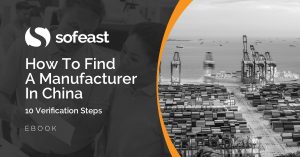 It came again to my attention recently that most SMEs buying from China are not aware of methods to collect information about potential suppliers. And, since the suppliers are not verified in any manner, scammers have multiplied and are targeting inexperienced importers.
It came again to my attention recently that most SMEs buying from China are not aware of methods to collect information about potential suppliers. And, since the suppliers are not verified in any manner, scammers have multiplied and are targeting inexperienced importers.
It doesn’t have to be this way. There are many tools out there to verify a potential supplier based in China.
1. Overt ways of verifying a supplier
1.1 Supplier/factory visit
The most obvious is to pay them a visit. Is it one guy in an apartment? Is it a sizeable manufacturing operation? Interestingly, one can make an educated guess by announcing an upcoming visit and reading their reaction. A legitimate supplier will welcome the visit, while a scammer will look for ways to avoid it.
If you can’t make a visit yourself, many quality assurance agencies, including ours, can do this for under 300 USD in most coastal areas of China. They allow you to know:
- Where are they? What does the building etc. look like? How many people work there?
- Do they usually make the type of products you are buying, or something totally different?
- What processes do they do in-house?
- Can they show official business licences and other official documents? Do they match with the company name they show in their email signature?
1.2 Factory audit
A more structured audit of the factory’s quality management system and processes will yield useful insights, among which:
- Do they seem reliable, or are they operating without a system in place? Where are the highest risks?
- What is their capacity (rough estimation)?
- And all other elements that I listed in 1.1
This type of service is more expensive than the simple factory visit. It is quite useful for evaluating a large factor, but can be overkill for a small operation.
2. Covert ways of verifying a supplier
2.1 Background check
Several official pieces of information can be retrieved on the internet:
- Official registrations (in Chinese)
- Certificates
- Various online sources (buyers can usually do this by googling the company name, the mobile phone number, etc.)
In addition, it is possible to call the supplier’s contact person and ask a few questions on behalf of a buyer who desires to remain anonymous. A legitimate supplier will say a few facts that don’t constitute a commercial secret, whereas a shady supplier will not want to disclose anything and will often be aggressive on the phone.
2.2 Credit rating
Factory bankruptcies are getting more and more common, it seems. You might do business with a legitimate company that “goes under” just as they finished your production. Guess what? You will likely never see your products.
It is quite difficult to get a Chinese company’s financial statements. However, it is possible to buy a credit rating report in order to evaluate the financial risk associated with a certain company.
It is particularly interesting because an unprofitable company is more likely to think in the very short term and to play rough games with its customers.
Are you wondering how to find a manufacturer in China who is well-suited to your needs and can also deliver on their promises?
Sofeast has developed 10 verification steps to help you find the right manufacturer. They’re shared in this FREE eBook: “How To Find A Manufacturer In China: 10 Verification Steps.”
It covers:
- Background checks
- Manufacturing capabilities
- Quality system auditing
- Engineering resources
- Pricing, negotiation, & contracts
- …and much, much more
Just hit the button below to get your copy:

